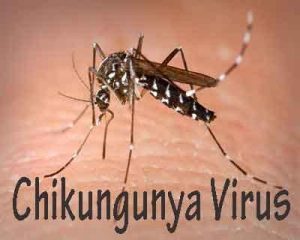- Home
- Editorial
- News
- Practice Guidelines
- Anesthesiology Guidelines
- Cancer Guidelines
- Cardiac Sciences Guidelines
- Critical Care Guidelines
- Dentistry Guidelines
- Dermatology Guidelines
- Diabetes and Endo Guidelines
- Diagnostics Guidelines
- ENT Guidelines
- Featured Practice Guidelines
- Gastroenterology Guidelines
- Geriatrics Guidelines
- Medicine Guidelines
- Nephrology Guidelines
- Neurosciences Guidelines
- Obs and Gynae Guidelines
- Ophthalmology Guidelines
- Orthopaedics Guidelines
- Paediatrics Guidelines
- Psychiatry Guidelines
- Pulmonology Guidelines
- Radiology Guidelines
- Surgery Guidelines
- Urology Guidelines
First Chikungunya-infected Aedes aegypti mosquitoes found in Brazil

While more than 13,000 cases of Chikungunya viral disease were reported in Brazil in 2015, scientists had never before detected the virus in a captured mosquito in this country. Now, researchers reporting in PLOS Neglected Tropical Diseases have identified a mosquito -- caught in the Brazilian city of Aracaju -- that's naturally infected with the East-Central-South-African (ECSA) genotype of Chikungunya.
Chikungunya, which often causes a fever and joint pain, is endemic in Africa and Asia and was first reported to be transmitted within Brazil in 2014. Researchers have identified three genotypes of Chikungunya virus (CHIKV) -- ECSA, West African, and Asian. Both ECSA and Asian genotypes of CHIKV have been reported in patients in Brazil, and all Brazilian states are infested with Aedes aegypti and Ae. albopictus mosquitoes, which have both been shown to be possible vectors of CHIKV in the lab.
In the new work, Margareth Capurro, of the University of Sao Paulo, Brazil, and colleagues collected 248 mosquitoes from both inside and outside homes in urban areas of Aracaju, where residents were complaining of symptoms consistent with CHIKV or related diseases. They then tested the mosquitoes for CHIKV, as well as dengue virus and Zika virus.
Four strains of mosquitoes were captured, with Culex quinquefasciatus the most common, making up 78.2%, and Ae. aegypti making up 20.2% of the mosquitoes. One female Aedes aegypti mosquito was identified as carrying CHIKV and when the genome was sequenced, it was found to be the ECSA genotype. No mosquitoes carrying dengue or Zika were identified in the current study.
"The surveillance of the Aedes mosquito should be expanded in order to prevent new CHIKV outbreaks in Brazil, since this country presents adequate conditions for the establishment of an endemic situation, which can also expose other countries at risk," the authors write.
For more details click on the link : André Luis Costa-da-Silva, Rafaella Sayuri Ioshino, Vivian Petersen, Antonio Fernando Lima, Marielton dos Passos Cunha, Michael R. Wiley, Jason T. Ladner, Karla Prieto, Gustavo Palacios, Danuza Duarte Costa, Lincoln Suesdek, Paolo Marinho de Andrade Zanotto, Margareth Lara Capurro. First report of naturally infected Aedes aegypti with chikungunya virus genotype ECSA in the Americas. PLOS Neglected Tropical Diseases, 2017; 11 (6): e0005630 DOI: 10.1371/journal.pntd.0005630

Disclaimer: This site is primarily intended for healthcare professionals. Any content/information on this website does not replace the advice of medical and/or health professionals and should not be construed as medical/diagnostic advice/endorsement or prescription. Use of this site is subject to our terms of use, privacy policy, advertisement policy. © 2020 Minerva Medical Treatment Pvt Ltd